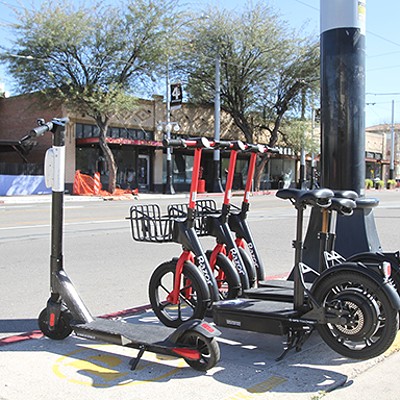Elections don’t come much closer than the last battle between Tucson City Councilwoman Karin Uhlich and her challenger, Republican Ben Buehler-Garcia.
When all the ballots were counted in 2009, Uhlich prevailed by just 175 votes.
And so this year, Buehler-Garcia is taking another shot at unseating Uhlich.
“In 2009, I ran for City Council because I was heartbroken by what had happened to our city,” Buehler-Garcia says. “I guess I’ve gone from being heartbroken to be plain, old angry. I know Tucson can do better.”
Buehler-Garcia offers a long list of reasons why he wants a rematch this year: The city’s roads are in terrible shape. There aren’t enough quality jobs. The council makes it too hard to open a business. Crime is rampant. And the final straw, for him: Seeing Tucson listed as the sixth-poorest metro area in the country by the U.S. Census Bureau in 2011.
“I am so passionate about this city’s potential and we’ve drifted so far from it,” Buehler-Garcia says.
As it works out, Uhlich agrees with her opponent on that point. “I think there’s a lot of potential to tap,” she says.
But she blames the city’s problems not on poor leadership but on the challenges created by a national economic slowdown that has impacted cities across the nation. She says a drop in sales taxes, reduced funding from state and federal government, and other financial problems have forced the city to tighten its belt by cutting employees and cutting back programs. In 2006, the city had just more than 6,000 employees; this year, it has fewer than 5,000—a number lower than the city’s authorized staffing level in 1995, according to city budget documents.
Even as the economy begins to recover, City Manager Richard Miranda warns that Tucson is still facing a structural deficit that officials have handled by refinancing debt, selling city property and taking other one-time steps to cover differences between revenues and expenditures.
Uhlich says her understanding of the budget can help her decide how to best guide the city as new revenues come in. Her priority is sticking with “basic stuff.”
“The temptation to invest in all kinds of different things is gonna come back and we’re gonna get asked to do things like give $150,000 to animal care and all these different things,” Uhlich says. “If we do that without first having taken care of the basics like roads and sidewalks and transit and public safety and parks and rec, then I think this city will miss the mark.”
Uhlich says that in a third term she can be even more effective because she now has the institutional knowledge to better serve the community.
“I’ve really hit my stride,” Uhlich says. “I think there’s a benefit to not only understanding the basics of the job but all of the dynamics that it takes to actually implement some change. I think it would benefit the city and Ward 3 to have my experience on the council.”
While Buehler-Garcia came close to an upset win in 2009, Democrats say there are several differences that will make it harder for him this year.
For starters, there’s no Green Party candidate in the race to siphon votes away from Uhlich. In 2009, Green Party candidate Mary DeCamp got more than 4,000 votes.
In addition, the city switched to an all-mail election two years ago, meaning that all voters automatically get ballots in the mail. That’s important because Republicans who have won elections in recent years have done so by pushing turnout on the eastside, where more Republican voters live, and relying on Democrats on the southside and westside to forget about voting. Even a small uptick in the percentage of Democrats voting could undermine Buehler-Garcia’s chances of winning; this election will be the first one since the new system was implemented to test whether more voters will send in their ballots in a nonmayoral election.
Finally, 2009 was a year in which Tea Party activists helped the GOP candidates gin up anger toward the incumbents. While Republicans remain plenty angry at the White House, the energy is palpably lower.
Part of that is because the city is, in many ways, better off. Four years ago, Republicans could point to downtown’s slow redevelopment as a reason to turn out the Democratic incumbents. Now, with downtown revitalization at hand, the old complaint about money wasted on Rio Nuevo no longer resonates. Buehler-Garcia himself says downtown “won’t be as much of an issue as it was in 2009 because there has been progress downtown,” but he throws in a dig: “You cannot rebuild an economy with bartenders and baristas. It’s nice, but that’s not a job that’s going to support a family.”
Buehler-Garcia says the city missed an opportunity by not trying to get Grand Canyon University to relocate in the downtown area.
Earlier this year, when the regional economic-development group TREO was reaching out to local jurisdictions to see if any of them wanted to make a pitch for a new campus for the private university, the city suggested that El Rio Golf Course could be a potential site.
Shortly after city officials started talks with GCU representatives, Councilwoman Regina Romero mentioned the proposal at a westside neighborhood association meeting. It was met with fierce resistance from some westside residents because the golf course had been the site of political protests in the late ’60s and early ’70s. Although Romero tried to argue that the university would create jobs and contribute to the maintenance of nearby Joaquin Murrieta Park, the political pushback was too strong, and she announced in May that she would not support the project, which ended the talks with the university.
Buehler-Garcia says the city should have offered the land on the west side of the Santa Cruz river downtown, where the modern streetcar line ends. It would have served as an anchor and brought new economic development to the westside.
“That was a win on 15 different levels, but I didn’t see Karin suggest that,” Buehler-Garcia says.
Uhlich’s background is in the nonprofit arena, working for organizations that aid the needy. She cut her teeth in politics as an aide to Howard Wolpe, a former Michigan congressman, and headed the Food Bank Council of Michigan.
After relocating to Arizona, Uhlich worked as executive director of the Primavera Foundation, a nonprofit dedicated to helping the homeless find jobs and shelter. She left that job to found the Center for Economic Integrity, a nonprofit focused on helping low-income people improve their financial standing; in particular, the group fought against payday lending institutions.
By contrast, Buehler-Garcia has been more engaged with the business community. Although he came to Tucson to study law enforcement at the UA, Buehler-Garcia landed a gig with the Tucson Metro Chamber of Commerce, where he worked in public relations and small-business advocacy. He made enough connections to strike out on his own with a consulting business that helped clients interact with local government agencies. On the side, he’s been involved in efforts to assist new airmen and their families at Davis-Monthan Air Force Base, as well as working on initiatives to support D-M’s mission.
Team Uhlich likes to point out that Buehler-Garcia’s big client these days is Rosemont Copper, the Canadian-backed firm that wants to build an milewide, half-mile-deep open pit mine whose operations would spill across acres of U.S. Forest Service land in the Santa Rita Mountains
“He’s the Rosemont Mine candidate,” Uhlich says. “I think the Rosemont Mine is not the right economic strategy for us to create jobs.”
While the City Council has little say over whether the mine opens, Uhlich did vote with the majority of the council to urge the Forest Service to reject the mining plan. She says the opposition of many local governments has forced Rosemont to develop a better plan.
“The mine might get approved, but if we had said ‘Welcome’ in 2007 without demanding mitigation—the original plan was way, way worse in terms of mitigation than the plan they have now,” Uhlich says.
Buehler-Garcia stands by his Rosemont work. At a forum last month, he told an audience that the mine is going to meet high environmental standards and create jobs in the community. “Rosemont is going to do the job right” and the City Council “should be embracing it,” Buehler Garcia says. “It strikes me as hypocritical that (Uhlich is) driving a city-financed car that has twice as much copper in it than the car I drive.”
Buehler-Garcia says he’s not embarrassed to have received support from Rosemont executives and their allies in the community. “Why would they not support me?” Buehler-Garcia asks. “I work for them. They like me. They know I’m a business-friendly kind of guy.”















